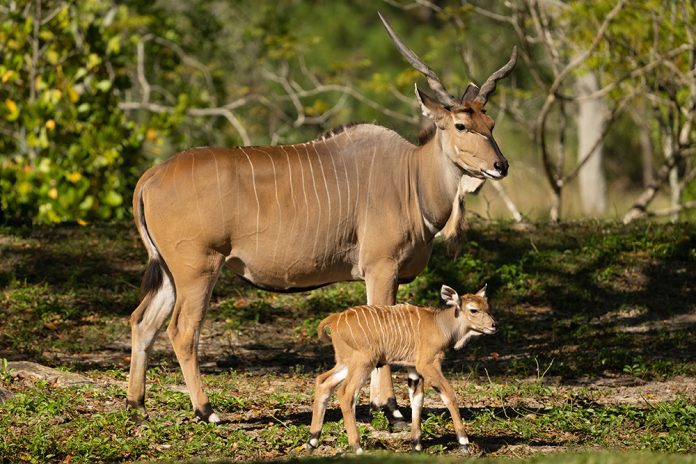|
Getting your Trinity Audio player ready...
|
Over the past 2 weeks, several new babies have been born at Zoo Miami and made their exhibit debuts under the watchful eyes of their mothers and the rest of their corresponding herds.
On November 7th, after an approximately 7-month pregnancy, a female Nyala calf was born. Soon after, on November 10th, a male calf was born. Both calves and their mothers are doing well.
Nyala are medium sized antelopes that are commonly found in the woodlands and thickets of Southern Africa, usually near water. Males can reach 250 pounds and have a distinctly different appearance than females with long spiraling horns, a dark gray coat, and a tall mane of hair that runs along the top of their back and under their chin and neck. Females rarely exceed 150 pounds, do not have any horns or manes, and have a chestnut red coloration. Both sexes have a series of vertical white stripes along their flanks.
On Saturday, November 18th, after an approximately 9-month pregnancy, a rare Giant Eland was born. The male calf weighed 53 pounds and was the 2nd calf for the 8-year-old mother and the 7-year old father’s first calf at Zoo Miami. Baby and mother are doing well and have access to their habitat with the rest of the herd. Mom will usually keep the newborn tucked in a discreet location for the first few days until the calf has adjusted well and will then be seen more often standing with the herd.
Giant Eland are the world’s largest antelope with males often weighing over 2,000 pounds. Females are a bit smaller. They are found in small areas of the savannahs and woodlands of Central Africa and are listed as vulnerable with the major threats being habitat destruction and hunting for their meat. They are tan to gray with thin white stripes on their flanks and are distinguished by large spiraling horns that are found in both sexes but are larger and thicker in the males.
This morning, the Giant Eland baby had its neonatal exam that consisted of getting weighed, an overall general physical, and blood collection. Initial indications are that he is healthy and doing well. In addition, the female Nyala calf had a re-check of a minor issue that was noted during her initial neonatal exam and she appears to be recovering well.
All of these babies can now be seen in their habitats!






